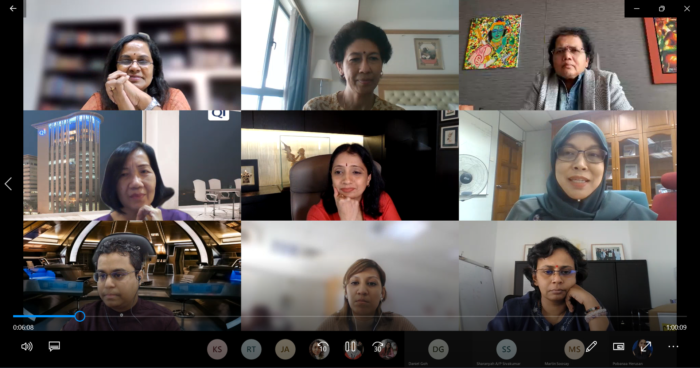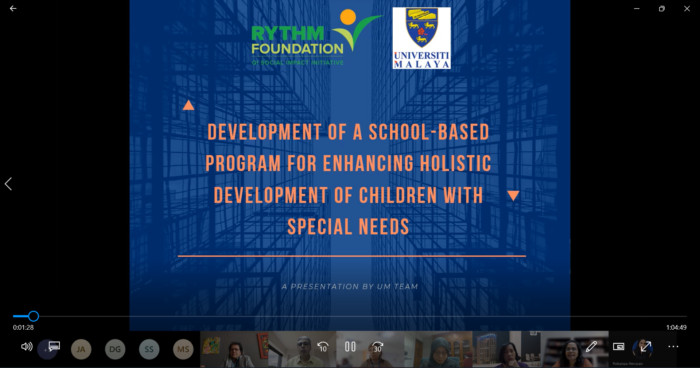Despite global efforts to improve education opportunities for all, children with special needs are still being left behind as their needs and access to education tend to be overlooked in policymaking. It’s a vicious cycle that continues to be fueled by the shockingly low expectations of what children with disabilities can achieve.
RYTHM Foundation believes that all children have varying degrees of potential waiting to be unlocked by a more inclusive, equitable and holistic education system that nurtures each child based on their strengths.
With this belief and a commitment to driving policy change for a better world in hand, RYTHM Foundation, the social impact arm of the QI Group, engaged a team of researchers from Universiti Malaya (UM) to uncover the on-the-ground reality of special needs education in Malaysia.
The RYTHM and UM study focused on gathering data to support the creation of a school-based programme for enhancing the holistic development of children with special needs and it is part of the foundation’s aspirations to set up a world-class institution that caters to differently abled children in Malaysia.
Despite the many movement restrictions due to the pandemic, phase one of the study was conducted from April to December 2021. Researchers explored the strengths and weaknesses of the current school-based programs offered by government, private and non-government institutions for children with special needs while identifying gaps, limitations, and opportunities for improvement.
Researchers surveyed 507 participants and conducted an interview study of 16 participants which included school administrators, teachers, parents, private institutions, NGOs, and professional associations to identify exemplary practices for educating children with special needs.
The survey and interviews found that teachers have a high readiness for inclusive education – a concept that integrates specially-abled children into regular classrooms based on the premise that students with disabilities are as fundamentally competent as their typically developed counterparts to be full participants in their classrooms and local school community.
However, the teachers’ readiness varied significantly based on teacher experience and exposure to training. Teachers who had previous experience and training in special education had more confidence in their ability to manage inclusive classrooms. However, while teachers may be trained to master classroom management for a certain disability, the reality is that they may have classrooms of students with varying degrees of abilities. Therefore, recommendations from this study heavily center around equipping teachers with a more diverse range of skills.
“Teachers are the main, key players. They need to be competent enough, prepared and confident to deal with a variety of learning disabilities,” said research lead and director of the UM Family Research and Development Centre, Associate Professor Dr Rafidah Aga Mohd Jaladin.
Mainstream teachers too appear passionate and ready for the added effort required to teach children with special education needs, however they lack the qualification and mentorship to guide them to be effective teachers. Despite continuous professional training, there is a lack of focus on inclusive education which has led to the teachers’ lack of confidence and competency in classroom and behaviour management for children with special needs.
The survey also showed that teachers without experience or training felt that students with special needs could disrupt classroom teaching and learning, leading researchers to the inference that training also needs to focus on the mindset and attitudes of teachers so that they are effectively prepared to manage inclusive classrooms.
The study also found that poor parental involvement or a mismatch in teacher-parent expectations as well as a severe lack of tools, facilities, and resources to educate children with special needs also pose major challenges to building effective inclusive education environments.
Phase one of this research has certainly already identified key areas that need to be explored further and yielded recommendations that will provide a reference for designing a comprehensive, holistic school based special needs education programme that can be replicated in schools around the country.

“This is a baseline analysis. We want to know what is happening out there and we want to learn from those who have good practices in educating children with special needs. The point of phase one is to study the current systems so that in phase two, we can design and develop a programme that can address the limitations of current systems and incorporate the strengths to meet the needs of the stakeholders,” said Dr Rafidah.
The team of researchers led by Dr Rafidah to conduct this deep dive into special needs education in Malaysia comprised Dr Donnie Adams, Associate Professor Dr Thilagavathi Shanmuganathan and Leong Shook Shiang. The relationship between RYTHM and UM has further deepened since the research kicked off, and from this, additional collaborations were organised to facilitate conversations around special needs education, such as at the RYTHM Foundation symposiums as well as at the Quest International University (QIU) Special Education: Moving Beyond Boundaries held in 2021.
During the virtual event where the team presented the results of the study, RYTHM Foundation Chairperson, Datin Sri Umayal Eswaran shared, “Every country talks about restructuring education moving forward, but in that, these kids fall through the cracks. Nobody pays attention to children with disabilities; but that is a growing number as we all know, and that is why I wanted this research to be done. When we have fully developed this paper, we want to go to the ministry and say this is the reality on the ground, let us do something to improve.”
It is the hope of the foundation that collaboration can foster an education system that considers students with special needs at the onset rather than as an afterthought as we work towards ensuring inclusive, equitable and quality education for all.





